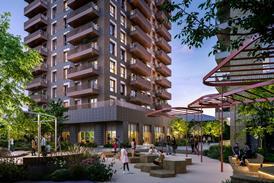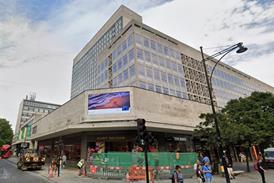Three-month call for evidence includes questions on whether Arb is fit for purpose
Architects and architecture schools are being asked for their views on whether the regulatory regime for architects and other built environment professions is fit for purpose.
The government today launched a 12-week call for evidence focusing on the role of the Arb.

It will form the first part of a “wholesale review” aiming to modernise the sector and improve its accessibility and innovation which will include thematic workshops and interviews. The Ministry of Housing, Communities and Local Government said it would also use desktop research to consider precedents from other countries and professions.
Topics will include how the architectural profession can become more diverse and whether the current regulatory system will work as new building safety legisation is introduced.
Respondents will also be asked for their views on the role of regulation in ensuring a more sustainable built environment and how the government can promote innovation in the sector.
Initial findings from the review will be put on the desk of housing minister Chris Pincher in spring next year, with the outcome expected to be announced in the summer.
Pincher said the review aimed to maintain the UK architectural sector’s reputation as one of the “best in the world”.
He said: “The review we are launching today builds on this outstanding legacy, looking to the future and exploring the changes we need for an innovative, accessible and broad profession that delivers better, greener and safer design and construction.”
Government’s last “periodic revew” of Arb ran from 2014-17 but regulatory changes and the need for new trade deals post-Brexit as well as the new building safety landscape post-Grenfell are among the reasons for the new review.
In his foreword to the survey, Pincher said: “The time is right to have a bigger and longer-term focused conversation with the architectural sector about the purpose of regulation and government policy in this sector and how they could be improved to deliver a modern, innovative, accessible and diverse profession that delivers better, greener and safer design and construction in the built environment.”
The call for evidence follows a recent consultation on changes to the way that architects are regulated and public engagement exercises by Arb.
It also comes as new powers are set to be granted to Arb under the Building Safety Bill, which was published last month, to strike off architects from the register if they fail to meet new competence standards.
Arb chair Alan Kershaw said it was “essential” that architects have a “renewed and modern” policy framework.
“The government’s review asks important questions about policy and regulation and we look forward to playing a full part in shaping and supporting an architectural profession that is fit for the future,” he said.

RIBA president Alan Jones welcomed the “very timely” review and urged the “entire profession” to contribute.
He said: “The climate emergency and building safety crisis continue to prompt and prove the urgent need for regulated architects’ expertise throughout the entire timeline of each project.”
>> Eleanor Jolliffe: On building safety, professional qualifications should count
>> Also read: Analysis: What on earth is happening at the RIBA?
Jones added that the review provides an opportunity to demonstrate the value architects bring to society and expand on issues the profession faces, including those stemming from impending changes to legislation such as ensuring professional competence and brokering mutual recognition of qualifications (MRPQ) agreements.
The review also follows the launch of the Office for Place, a new body within MHCLG that is intended to help communities demand better design standards in new developments using design codes.
Niralee Casson, a senior architect, Assael Architecture, welcomed the review. ”Seeing diversity and inclusivity tabled alongside traditional architectural issues, such as social value, sustainability, and safety, is a positive move to embedding these values within the profession from the outset,” she said.
Postscript
Share your views below or on social media using the hashtag #BDFutureProf
















4 Readers' comments